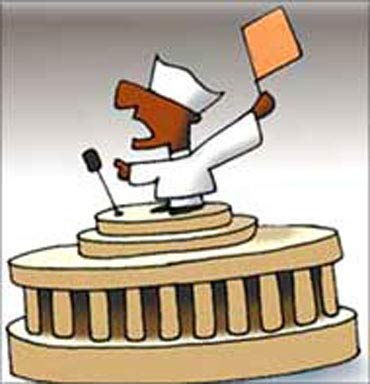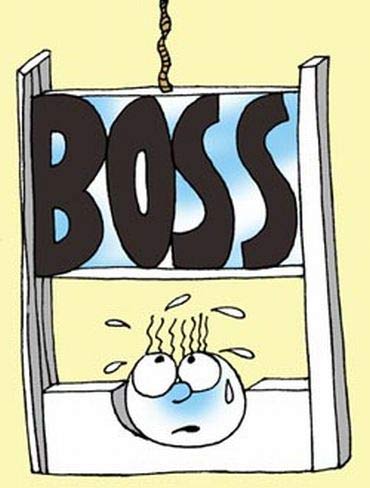Photographs: Uttam Ghosh/Rediff.com S S Kumar
The year 2010, while good in some parts, has not really been too good for the United Progressive Alliance, with scam after scam rocking the government.
While people are upset with the government's inability to control corruption and rising prices, they are also annoyed because of the lack of any achievements during 2010 that could be called truly outstanding.
Here are some ways the government's performance can be fine-tuned for better marks:
. . .S S Kumar is chairman & MD of ASTRAL Systems that specialises in offering consultancy, training and security solutions to leading organisations in India.
A 7-point plan to improve the govt's performance
Photographs: Uttam Ghosh/Rediff.com
1. Start with the right blend of competent ministers in the Union Cabinet
Firstly, you need ministers who are passionate about the success of their ministries. You cannot have ministers holding charge of important ministries based only on political considerations even though they do nothing.
Likewise, you cannot have a railway minister in Delhi who spends the better part of the year in Kolkata.
. . .
A 7-point plan to improve the govt's performance
Photographs: Uttam Ghosh/Rediff.com
2. Goal-driven ministries
At the beginning of each year, the prime minister should call each Cabinet minister and ask him, or her, to make a televised presentation on:
a) What goals s/he had set for his ministry for the previous year;
b) To what extent s/he met them and reasons for not meeting the rest;
c) Goals for the new year;
d) How s/he proposes to go about meeting them;
e) How can s/he improve the performance of his/her ministry.
When the goals are not clearly defined, we see ministers talking on subjects that do not pertain to them.
. . .
A 7-point plan to improve the govt's performance
Photographs: Uttam Ghosh/Rediff.com
3. Time to try cross matrix type of management
A ministry is nothing but a group of people whom fate has thrown together, not necessarily with the requisite expertise. We are fortunate to have men like P Chidambaram, Kabil Sibal, and Pranab Mukherjee who are stalwarts in their own right and have made a difference to the quality of governance.
But at the same time, it would not hurt if to each ministry were attached an experts' consulting group to help improve performance and take it beyond the ordinary.
For instance, we would not have gone through the spectacle of rapidly rising food prices if there was an experts' group monitoring and advising the ministry in a timely manner.
A ministry, especially the agriculture ministry, is an important and critical ministry that can ruin several lives if not handled properly.
The way millions of tonnes of foodgrains are stored and left to contaminate in the rain nauseates most Indians.
Is the problem so insolvable that it defies a solution? Certainly not. It betrays a lack of serious, proactive, sensible pragmatic thinking. Is it impossible to quickly construct 1,000 new godowns before the next monsoons or to requisition a few hundred closed railway wagons for temporary storage? Food for thought, perhaps.
Forget pro-activity, there has been no activity witnessed from this ministry at all to salvage the situation.
. . .
A 7-point plan to improve the govt's performance
Photographs: Uttam Ghosh/Rediff.com
4. Progress report to the nation
Former prime minister Rajiv Gandhi had started a welcome trend by having each of his key ministers face an expert panel on TV and answer not only their queries on their ministry's performance but also queries from the audience.
This will serve two purposes, a) keep the large population informed and help weed out the incompetent ministers from just warming up their seats and doing nothing constructive; and b) it will also keep the ministers on their toes and push them towards excellence.
. . .
A 7-point plan to improve the govt's performance
Photographs: Uttam Ghosh/Rediff.com
5. Usher in a new spirit of 'can do' to solve existing problems
Most multinational companies that I worked with had a strategy of coming up with a few 'breakthrough' goals for the new year.
While the routine goals were like growing at a rate better than the industry average, we also focussed on a few 'breakthrough' goals, like making a breakthrough into an account which was always a competitor's stronghold or an account which was never cultivated by anyone earlier but looked full of potential.
How does this relate to ministries' functioning? For instance, we have always mentally associated tourism with incoming foreigners visiting Jaipur, Kashmir, Agra, Goa, etc. For a change, why don't we take it as a breakthrough objective and get more visitors to visit the eastern states of Assam, Mizoram, Nagaland, Sikkim, etc each of which has really beautiful unexplored scenic beauty; sites that are still unexplored?
To be a success, this has to be a joint Centre-State exercise wherein you plan promotion campaigns, through the media and our foreign missions, etc. Change always inflicts pain but this pain is well worth going through if we want to see increased tourism.
Each year we can focus on one particular region or state, for all round tourism to grow. If tourism grows, it will spawn the development of new 5-star hotels driven by demand, will create more jobs and also small-scale industries.
. . .
A 7-point plan to improve the govt's performance
Photographs: Uttam Ghosh/Rediff.com
Most states do not have the expertise to mount a campaign to attract tourists. Private ad agencies, I am sure, would be too delighted to help the state governments, put up more effective ad campaigns because they have the necessary skill sets.
Likewise, most service-type organisations in the private sector work towards getting themselves quickly assessed for ISO standards to assure their potential clients that they are a standards-driven and quality-conscious organisation.
Can we expect some of the ministries in the services segment like power, water, etc work doggedly towards similar assessments?
These assessments basically are a pre-requisite for the establishment of sound, repeatable processes.
This would help usher in sound processes within each of these ministries and end the era of crude, indifferent responses from government officials when the common man approaches them for problem resolution assistance and guidance.
A classic example of this rude indifference is when telephone services were a monopoly of the BSNL a decade ago. Even after 21 days, your phones continued to be 'out of order' with no soul attending to your requests. One had to virtually bribe the linesman to come and attend to it.
. . .
A 7-point plan to improve the govt's performance
Photographs: Uttam Ghosh/Rediff.com
6. Evaluate performance through independent audits
Not long ago, India Today evaluated the performance of several chief ministers and the then Karanatak chief minister S M Krishna came out on tops. No one has been able to touch his class since then. It also showed that most of his successors were mediocre, more interested in accumulating wealth than providing leadership.
We need agencies to carry out independent performance audit of each ministry at the Centre and in the states so that we have real life metrics to define each entity's performance that the public is willing to trust and accept.
This will help prick the balloon of those trying to get away with false claims of performance. It is like facing a colony map. Unless you know where you are, you are very unlikely to locate your friend's house.
. . .
A 7-point plan to improve the govt's performance
Photographs: Uttam Ghosh/Rediff.com
7. There is no alternative to good governance
The minimum expectation of the people from the government is good governance. People want to see less crime and less corruption.
If people are caught having done something wrong, they must be seen to be punished within 3 to 4 months.
In terms of the bottom line, the functioning of any government must be able to give back to the people their faith in their cherished value systems.
Nothing less would do for them.










article